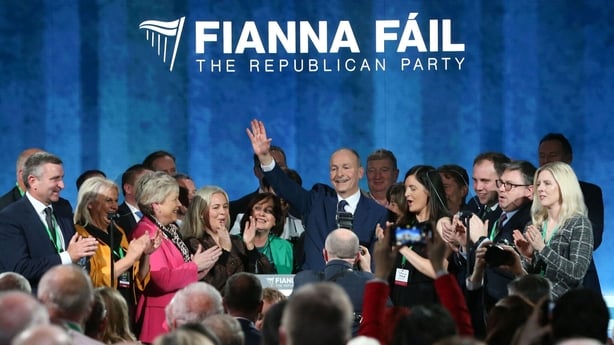Party conference speeches are no longer the vehicle for announcing new policy positions.
Instead, politicians use them to cement relationships with members and deliver a message to a broader television audience.
Tánaiste Micheál Martin's address to the Fianna Fáil faithful at the Ard Fheis relayed the party’s view of its achievements in Government.
It set out that it had unfinished business in the remaining year-and-a-bit before the next general election.
On housing, he cited the usual barrage of statistics proclaiming that a corner has been turned.
And there was the pop at the leading opposition party, Sinn Féin, who he says is negative towards homeownership.
But the centrepiece of the speech was strong condemnation of the actions on both sides of the conflict in the Middle East.
"The brutal savagery of Hamas has no justification whatsoever - and no one who believes in core human values should have a problem saying this," he said.
"And Israel has a fundamental obligation to respond within the boundaries of international humanitarian law. Civilians must be protected."
And Mr Martin restated his call for a humanitarian ceasefire and the release of hostages.
All this delivered in the presence of Israeli ambassador Dana Erlich.

His speech also touched on health, the importance of the European Union and Mr Martin's Shared Island Initiative.
In a new venue in Dublin city centre, the mood among delegates seemed pretty positive, with most echoing the view of the party leader that it's all to play for in the next election.
Indeed, Micheál Martin cannot hide his impatience at journalists persisting in asking the same question about whether Fianna Fáil could go into coalition with Sinn Féin after the next election.
His response has softened since 2020 when he ruled them out unequivocally.
Now the stock answer is to dismiss Sinn Féin's policies as populist and not serious but to not quite entirely dismiss the party as a future partner.
His annoyance also flared at a framing of Sinn Féin being in pole position to form a Government after the next election, with a repeated insistence that it is all to play for, polls have been wrong before and the current coalition could be re-elected.
That is an optimistic view based on current polling, but there is still a lot of time to run and the legacy of the 2020 election is that the campaign matters hugely.
The current focus for Fianna Fáil is next June's local and European elections and party candidates were prominent in today's lineup.
But despite insistence that candidate selection is going well, some TDs have said that locally, things are not so straightforward with fewer people willing to take the flak that comes with being a public representative.
The locals will also be an important electoral test, with Fianna Fáil under more pressure because it did so well in 2019 meaning it has many seats to retain and any drop in performance could be pronounced.
For Europe, the party will be hoping to make a gain in Midlands-North-West which is slated to gain Ireland’s new seat.
So far, Senators Lisa Chambers and Niall Blaney have declared their intention to run, with rumours also around Laois-Offaly TD Barry Cowen.
One familiar face was warmly greeted by delegates - the re-embraced former taoiseach Bertie Ahern, back in the party and back working the room.
Overall, the mood seemed pretty upbeat with attendees fairly positive.
And the question of the leadership of the party seems pretty settled, with Micheál Martin firmly ensconced at the helm for his 12th year.
Rumblings of a heave have greatly died down and the sense is that the Tánaiste now wants to keep his options open.
This could mean staying on as Fianna Fáil leader to fight the next election or moving on to either the EU Commissioner position next year or even a tilt at the Presidency in 2025.







